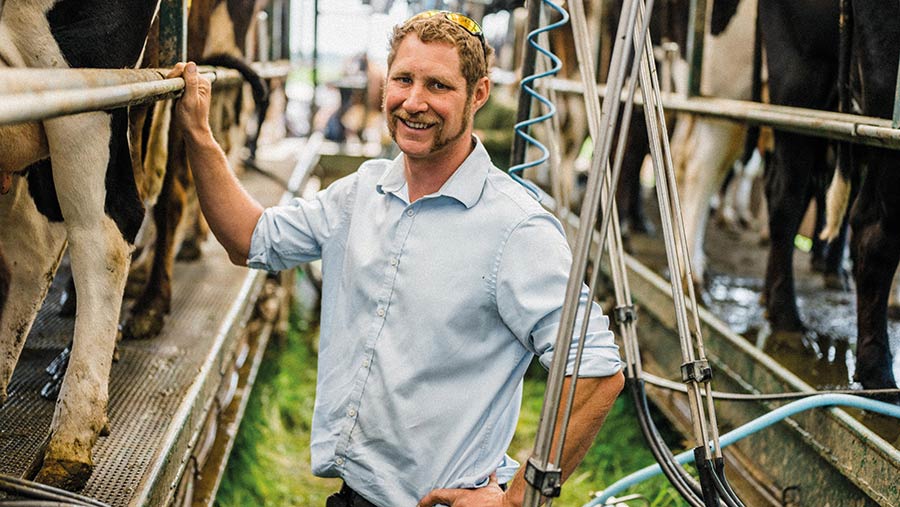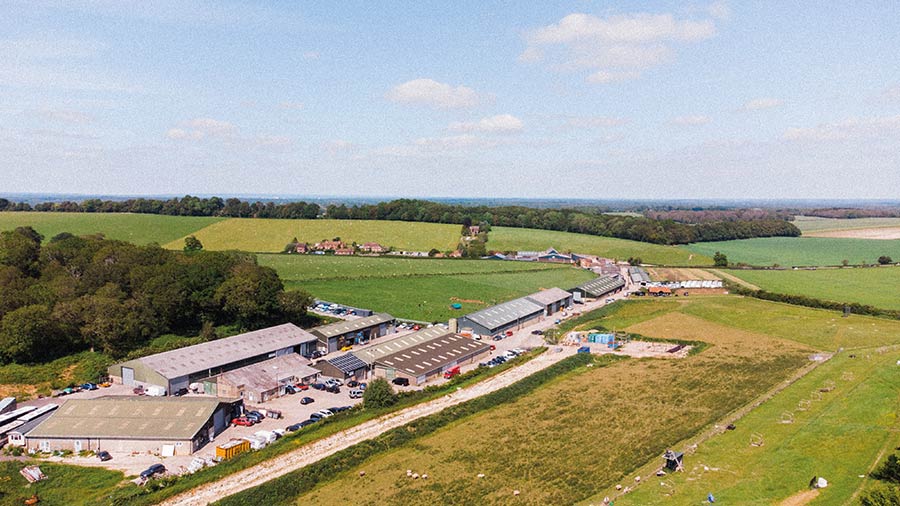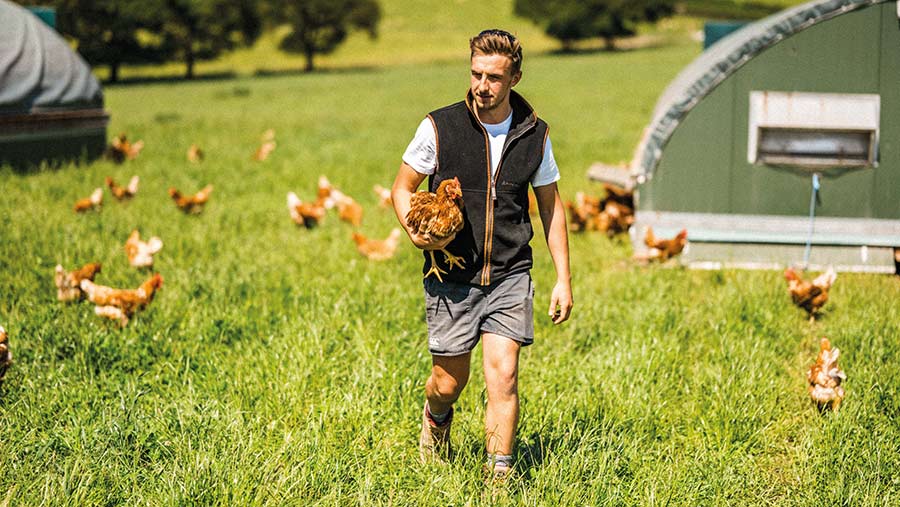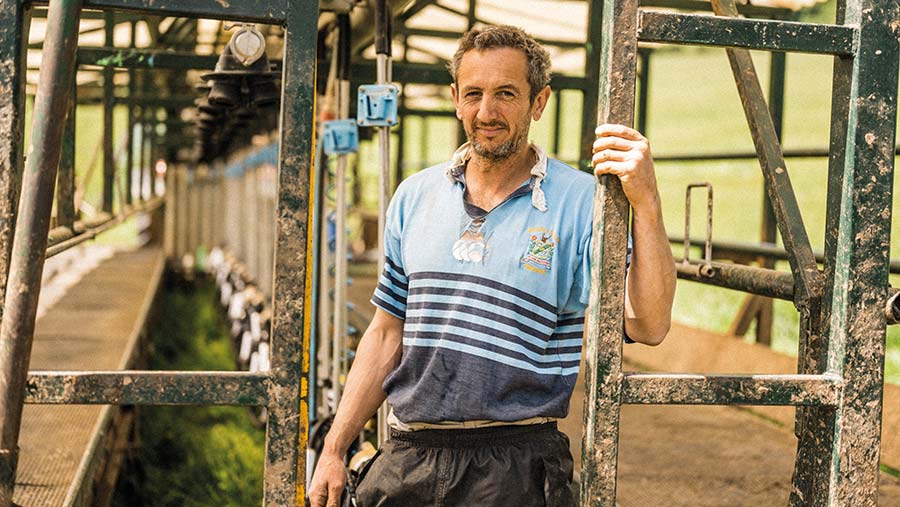Regenerative farmer seeks businesses to form sustainable community
 Tim May © Matt Austin
Tim May © Matt Austin Regenerative farmer Tim May is launching an ambitious project to bring more businesses onto Kingsclere Estate to build a community where each enterprise helps regenerate the land, reduces waste and keeps products and materials in use.
The idea is to create a “circular economy” that will see more than one business on the same piece of land to increase productivity.
Mr May says he wants to hear people’s ideas, no matter how diverse, whether they are start-up farmers, vegetable or raw material growers, pop-up restaurateurs or other businesses that could make use of the 40ha of woodland.
See also: 20 years of regenerative agriculture: One farm’s success story
He is offering access to buildings that can be used as a base for businesses or converted for production. For example, a planning application has been submitted for a micro-brewery.
The project is called Pitch Up – you can see details of how to apply at the bottom of this article.
“We are quite unique in that we are open for people to come and talk to us about how they can access our land and our ideas,” Mr May says. “It is not a free-for-all and they have got to be valid businesses – we are looking for ideas that can work.
“For the right business plan and the right person, the opportunities are pretty huge.
“The key for us is the integration and making sure the people and ideas can integrate with others at Kingsclere.”
Watch the Kingsclere Estate video about the project and read more about the farming and enterprises on the estate bellow.
Regenerative farming
Mr May has been working to improve the soil and increase biodiversity since 2011 at Kingsclere Estate, a 1,000ha fourth-generation family farm, located between Newbury and Basingstoke in north-west Hampshire.
It is a journey that has seen livestock return to the land to build organic matter and help repair fields which for decades had been used solely to grow crops.
Managed grazing has helped return nutrients to the soil and improve root structure.
Visiting farms in the US, as part of a Nuffield scholarship looking at sustainability in agriculture, helped Mr May set the course for his farm to work better with nature.
“I realised there was a lot of talk about social sustainability and environmental sustainability, but very little about economic sustainability,” he says.
“Sustainability for me was all about understanding cycles we are involved in.
“That meant trying to understand a bit more about how we could integrate with nature. So that was the primary reason we bought grass back into the rotation.
“In order for us to continue as a business, we needed to become more productive – that wasn’t necessarily increasing yields, it was about the margins on produce being better.”

Kinsgclere Estate © Matt Austin
Range of enterprises
There is one poultry and two livestock enterprises on the farm at present: Pasture Raised Egg Company run by Ben Reynaldo (see panel), the Roaming Dairy Run by Oliver Chedgey (see below), and a flock of sheep managed by farmer James Edwards, who supplies the Ethical Butcher online meat delivery company in London.
The mobile egg and dairy units are the first working examples of enterprise stacking on the estate, where both businesses can use the same piece of land to be more productive.
As the cows move through their grazing rotation, the chickens follow behind, feeding on the insects attracted by the manure and helping to spread it across the fields.
The chickens are able to scavenge fresh ground, which is good for their welfare and quality of laying, and they are eating a good source of protein thanks to the conditions created by the roaming dairy.
“We wanted the grass to rotate around the arable fields, so it was really important that whatever enterprise we had, it had to be mobile,” says Mr May.
Retail opportunities
There are roadside retail opportunities, with more than 17,000 cars a day passing by the estate’s main offices on the A339 road.
Ensuring different enterprises can work together for the benefit of the whole community is central to Mr May’s ambition.
He is eager to see more buildings converted for processing and gives the example of how cheesemakers using the estate’s milk could then benefit another livestock enterprise.
“We know from processing there is often by-products, which for some, if you were in the middle of town and not on a farm, it would be seen as a waste, like whey from a cheese producer,” he says.
“Whereas if we were back on farm and had whey, we could transfer that to a pig enterprise [for feed], which is adding fertility to a low-fertility area of the farm.
“Then you’ve got your pig enterprise and all of a sudden you have created on farm the ability to sell milk, bacon and cheese, all from the same story.”
It is these connections the farmer wants to create and nurture over the next 10 years.
“We want to be at the stage where we are seen as an area of quite critical importance and leading in this sort of field, and able to offer internships and apprenticeships because we have got enough enterprises going on that we can offer some sound advice.”
The Pasture Raised Egg Company

Ben Reynaldo © Matt Austin
Carpenter Ben Reynaldo has successfully established his mobile organic egg laying poultry unit on the Kingsclere Estate, but wants to expand further and make the business his primary income.
Four custom-built sheds on hooklift trailers house 300 chickens each and follow the dairy cows. Electric fencing protects the birds.
Tim May has provided mentorship as part of the shared farming agreement. The eggs are delivered locally, sold in a vending machine and through Tend, an online farm marketplace.
Mr Reynaldo says is biggest challenge is selling the story of his produce to consumers, and explaining why the organic eggs are worth the extra value.
He is excited by the Pitch Up initiative (see panel) and Mr May giving sustainable businesses and food producers a chance.
“There needs to be more opportunities like this around the UK for people. More and more people are looking at what Tim is doing now and seeing it as a good idea.”
The Roaming Dairy

Oliver Chedgey © Matt Austin
Oliver Chedgey has been milking cows in his mobile parlour on the Kingsclere Estate since 2017. He has two full-time staff and the 450-strong herd produces organic milk for Arla.
Mr Chedgey, who has run successful beef and sheep enterprises in Wiltshire, is in a shared farming agreement with Tim May. The pair split the milk price based on the resources they put in.
The estate owns half the herd and provides the grazing, and Mr Chedgey owns the machinery and does the milking with his team.
“The cows are milked once a day and it is something that works for us and the land with their grazing,” he says.
“It is good for us as we can start at about 7.30am and are done by 5pm, and the rotational grazing is improving the soil, and milking on location is good for the cows’ welfare.”
The whole business plan was set up around the once-a-day-milking mobile system, which has seen the enterprise cover borrowings and go into profit within the first five years, Mr May explains.
“That is pretty unheard of, but essential for a start-up business. They can’t sit around for 10 years hoping it is going to pay off. They need to be in profit as soon as possible, and this system has delivered it for him.”
What is Pitch Up?
Kingsclere Estate is inviting businesses to “pitch for their pitch” and help its ambition to build a circular economy.
Applicants need to make a two-minute video or write a 200-word overview to summarise the following:
- Business idea
- Motivation behind it
- Business need or market opportunity it addresses
- Environmental and sustainability credentials
- Why it works at Kingsclere Estate
For successful pitches, the estate is offering a wide range of support, including land, office space, low overheads, shared running costs, minimised risk, business advice and shared industry knowledge.
Applications are open between 1-30 November and a shortlist will then be chosen to pitch their business idea at the estate on 7 January 2022. Find further details about applications at the Kingsclere Estate website.
